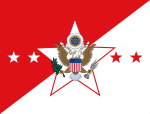John E. Hull
| John Hull | |
|---|---|
 | |
| Chair of the President's Intelligence Advisory Board | |
|
In office March 1, 1958 – January 20, 1961 | |
| President | Dwight Eisenhower |
| Preceded by | James Killian |
| Succeeded by | James Killian |
| Governor of the Ryukyu Islands | |
|
In office October 7, 1953 – April 1, 1955 | |
| President | Dwight Eisenhower |
| Preceded by | Mark Clark |
| Succeeded by | Max Taylor |
| Personal details | |
| Born |
May 26, 1895 Greenfield, Ohio, U.S. |
| Died |
June 10, 1975 (aged 80) Washington, D.C., U.S. |
| Alma mater |
Miami University Widener University |
| Awards |
Silver Star Legion of Merit |
| Military service | |
| Allegiance |
|
| Service/branch |
|
| Years of service | 1917–1955 |
| Rank |
|
| Commands |
Far East Command United States Army Pacific |
| Battles/wars |
World War I World War II |
John Edwin Hull (May 26, 1895, Greenfield, Ohio – June 10, 1975) was a U.S. Army general, former Vice Chief of Staff of the U.S. Army, commanded Far East Command from 1953–1955 and the U.S. Army, Pacific from 1948-1949. He served in both world wars and was a contemporary of General George Marshall and General Omar Bradley. Because of his primary role in planning Allied operations throughout World War II, he was credited with having more experience integrating strategy with overseas operations than any other Army officer.
Hull was a pre-medical student at Miami University in Oxford, Ohio, prior to joining the Army in 1917. He received an honorary LLD in 1954. His military education includes the Army War College and the National War College.
Prior to the U.S. Army, Pacific, Hull was the Commanding General for Army Ground Forces in the Pacific. From 1953-1955 he was Commander in Chief of the Far East Command after the conclusion of the Korean War. This was his last major assignment before retiring on April 30, 1955.
Other significant assignments for Hull involved major staff duties in Washington, D.C.. Among these were Director of the Weapons Evaluation Group and Deputy Chief of Staff for Operations and Administration for the Office of the Secretary of Defense. At the outbreak of World War II he was assigned to the War Department. Hull died on June 10, 1975.
Awards and decorations
 Army Staff Identification Badge Army Staff Identification Badge |
References
![]() This article incorporates public domain material from the United States Government document "".
This article incorporates public domain material from the United States Government document "".
| Military offices | ||
|---|---|---|
| Preceded by Wade Haislip |
Vice Chief of Staff of the United States Army 1951–1953 |
Succeeded by Charles Bolte |
| Political offices | ||
| Preceded by Mark Clark |
Governor of the Ryukyu Islands 1953–1955 |
Succeeded by Max Taylor |
| Government offices | ||
| Preceded by James Killian |
Chair of the President's Intelligence Advisory Board 1958–1961 |
Succeeded by James Killian |

